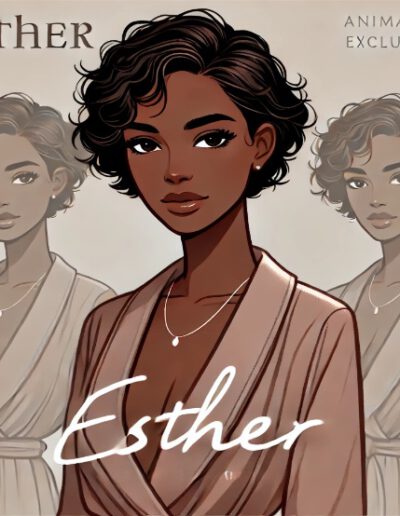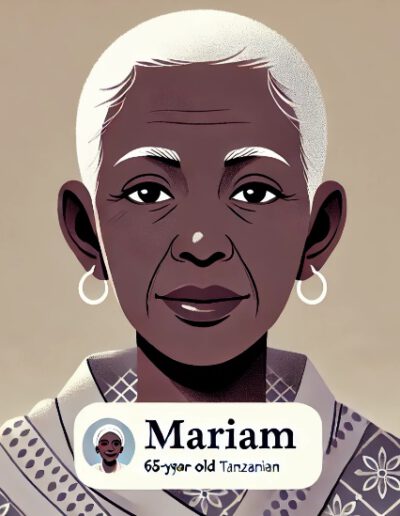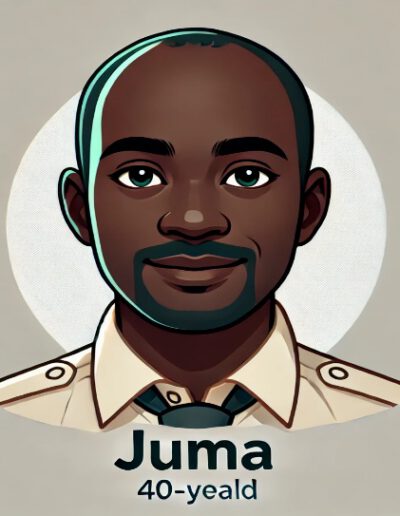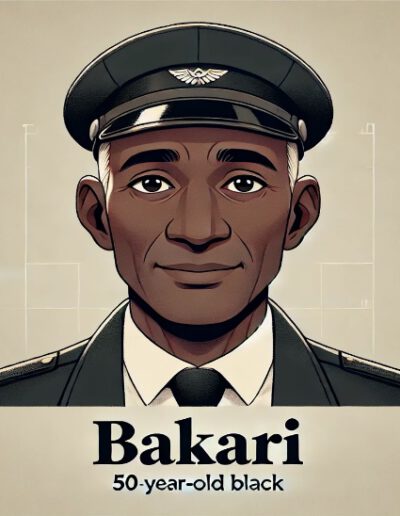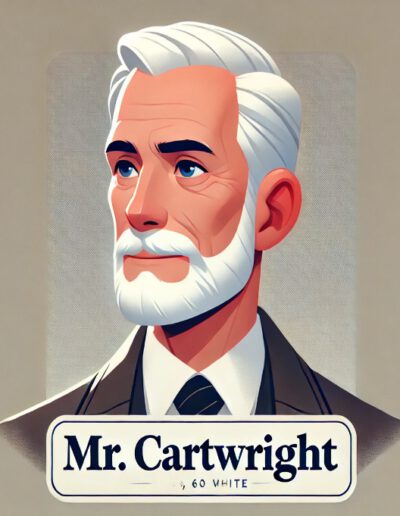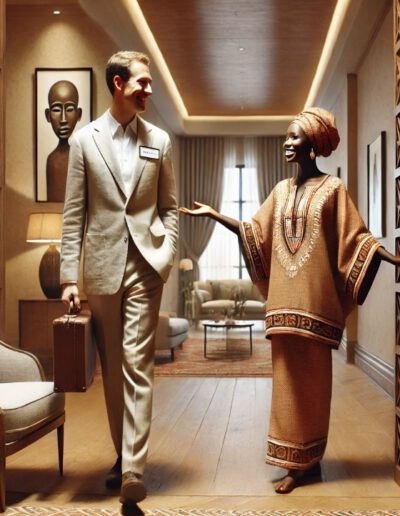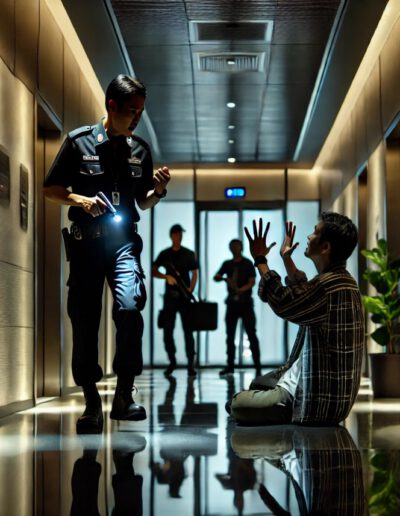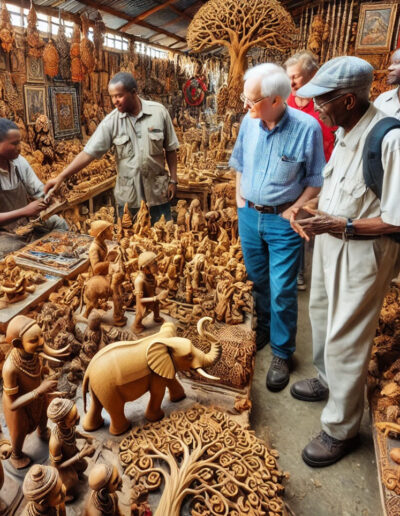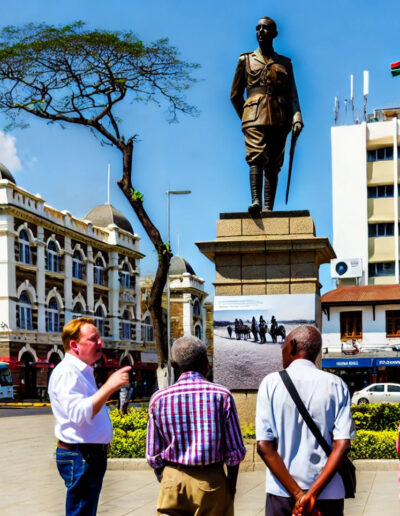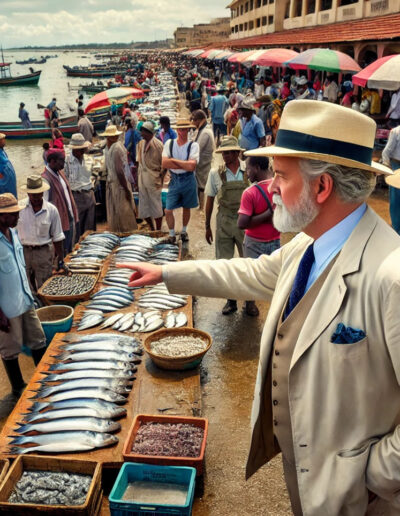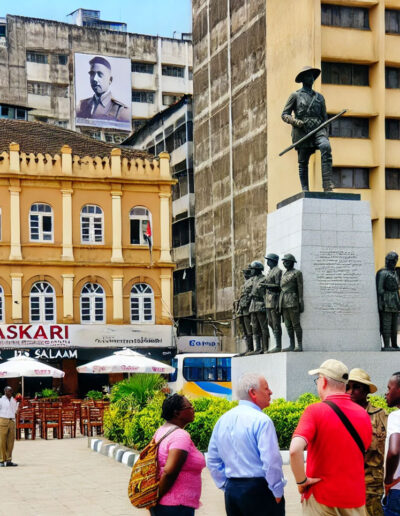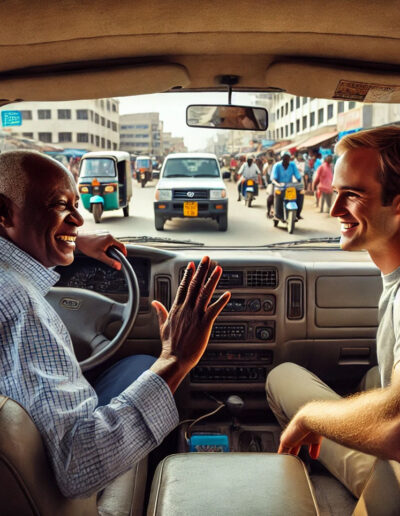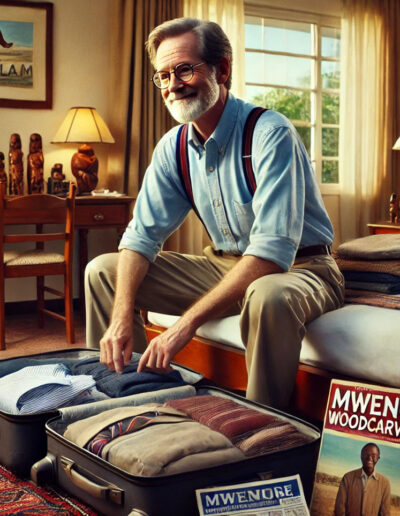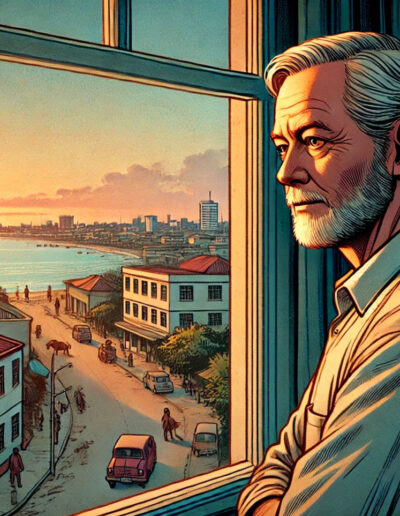I. John Whitmore’s Arrival in Dar es Salaam
It was a late afternoon in November when John Whitmore, CEO of the English car manufacturer Newmota, landed at Dar es Salaam’s international airport. The hot, tropical air greeted him as soon as he stepped off the plane, guiding him across the tarmac toward the modern airport building. He had traveled far—from the cool, misty climes of London to the sunlit coastal city of Tanzania. Yet, despite the long distance, he felt with every step that he was approaching an adventure that was significant both professionally and personally.
At the airport exit, he spotted a large sign bearing the Newmota logo, which immediately caught his eye. Next to it stood a discreetly dressed driver with a polite smile, who approached him as soon as he saw him. “Mr. Whitmore, I’m pleased to welcome you to Dar es Salaam,” the driver said with a gentle bow. “My name is Juma, and I will be taking you to your accommodation.”
The driver’s formality and respectful tone gave Whitmore an instant sense of being well taken care of. After kindly taking Whitmore’s luggage and stowing it in the trunk of an elegant SUV, Juma opened the passenger door with an almost ceremonial gesture. John Whitmore climbed in, and as the car began to move smoothly, he took in the landscape that unfolded before him: palm trees, gentle hills, and the sparkling blue of the ocean in the distance.
“It’s your first trip to Tanzania, isn’t it?” Juma asked in a warm voice that rose above the gentle hum of the engine. “Yes,” Whitmore replied with a smile. “But I already feel welcome.”
The drive went smoothly, and the traffic, which was usually unpredictable in Dar es Salaam, seemed calm and orderly that day. The sun was still high enough to cast a golden glow on the horizon as they reached the bustling streets of the city. Juma skillfully navigated the winding streets until they arrived in the upscale neighborhood of Upanga, an area known for its elegant blend of modern buildings and traditional villas. Finally, they stopped in front of an impressive building with large windows, its facade glowing in the light of the late afternoon. “Welcome to Nyumba na Jua,” Juma said, opening the door and inviting Mr. Whitmore to step out.
Two women were already waiting on the steps of the building. One of them, dressed in a smart but understated pantsuit, approached him with a professional smile. “Mr. Whitmore, I’m Mariam, the director of Nyumba na Jua. It’s an honor to welcome you here.” Beside her stood a younger woman whose warm smile instantly heightened the sense of hospitality. “And this is Furaha, one of our team members who will be at your service for anything you may need.”
“It’s a pleasure to meet you both,” Whitmore replied, feeling the tension from his travels slowly melt away. “Thank you for this warm welcome.”
“Come, let us show you to your apartment,” said Mariam, leading him into the building. They took the elevator to the top floor, and as the doors opened, he stepped into a bright, airy apartment, tastefully decorated in a style that was both modern and African. The large windows offered a breathtaking view of the city and the shimmering waters of the Indian Ocean in the distance. Every corner of the apartment seemed thoughtfully designed, from the soft leather sofas in the living room to the fully equipped kitchen with marble countertops gleaming in the sunlight.
“This apartment,” Mariam explained, “will be your home for the next year. It’s not only stylish but also equipped with everything you need to work both in the office and remotely from here. We know you’ll be spending a lot of time at Newmota, but we want you to feel comfortable here whenever you are at home.”
“And should you need anything,” Furaha added, “I’m available at any time. I’ll take care of any requests, whether they’re for everyday errands or special needs.”
John Whitmore walked through the rooms, admiring the successful combination of elegance and functionality. Modern technology was subtly integrated throughout the apartment. There was a small study where he could retreat to work from home and a cozy seating area inviting him to relaxed evenings. The apartment was a perfect sanctuary after the long workdays he anticipated.
“I’m delighted,” he finally said, returning to Mariam and Furaha. “Not only was the drive from the airport smooth and safe, but this welcome and the apartment itself—it already feels as if I’ve arrived at home.”
Mariam smiled with pride. “That’s our goal, Mr. Whitmore. We want you to feel welcome from the very first moment. Your new life here should begin as pleasantly and seamlessly as possible.”
He nodded gratefully. “I’m sure this will be a wonderful start to my new adventure here in Dar es Salaam. I already feel as though I’m part of this wonderful city.”
II. John Whitmore’s First Workday in Dar es Salaam
John Whitmore awoke on the morning of his first workday in Dar es Salaam feeling refreshed and at peace. The tropical air, gently drifting through the open bedroom window, carried the scent of blooming flowers and a distant ocean. It had been a wonderful night, quiet and peaceful, and the tension from the recent travel days seemed to have faded away in the silent darkness. The first rays of sunlight painted bright stripes on the walls of the modern apartment provided by his company.
As he entered the kitchen, John was pleasantly surprised: the refrigerator was generously stocked, filled with fresh tropical fruits, a selection of cheeses, fine bread, and a variety of juices. Smiling with satisfaction, he prepared a breakfast fit for a king. Mangoes, pineapples, and papaya gleamed in the morning sun, accompanied by freshly brewed coffee, whose aroma filled the room. It was a gentle start to the day, making him feel truly at home.
While enjoying the first bites of his breakfast, he thought of thanking Furaha, the housekeeper, for the excellent upkeep of the apartment. The impeccably maintained rooms and thoughtful furnishings had already impressed him upon his arrival. He took his phone and gave her a call.
“Good morning, Furaha,” he began politely. “I just wanted to thank you for the excellent work. The apartment is in perfect condition, and the refrigerator is wonderfully stocked. I’m truly impressed.”
“Thank you very much, Mr. Whitmore,” Furaha replied warmly. “I’m glad you like it.”
“I have a small request,” he added. “Could you perhaps run a few errands for me? Of course, I will cover all costs, and I want to set up a fair service fee for your time and efforts.”
“With pleasure, Mr. Whitmore. I will take care of it right away.”
After the call, John leaned back, feeling satisfied. He appreciated the professional yet warm tone that seemed to be a natural part of life in Tanzania. Later, when Furaha had completed the errands, he left her a generous tip as a token of his gratitude.
Around ten o’clock, it was time to head out. Juma, his attentive driver, was already waiting outside. John climbed into the air-conditioned car, and they drove at a leisurely pace through Dar es Salaam’s busy streets. The city pulsed with life, yet there was a certain calmness—a serene energy that contrasted with the hustle and bustle of Western cities. The ocean sparkled in the distance, and the palm trees swayed gently in the wind.
Upon arriving at Newmota, the company he would be working for as a senior manager, he was warmly welcomed. The head of the company, an older gentleman with gray hair and a firm handshake, personally greeted him and gave him a tour of the modern office spaces. John was fascinated by the company’s style, which exuded a perfect blend of African traditions and international professionalism. The employees appeared motivated and competent, and interactions were marked by respect and a subtle smile. John felt that he was in good hands.
After a productive introduction to his new responsibilities and some meetings with key department heads, he decided to spend his lunch break at a nearby hotel. The meal was a feast for the senses: fresh fish, exotic spices, and a glass of chilled white wine that perfectly balanced the day’s heat. He enjoyed the tranquility of the moment as he gazed out over the hotel’s expansive gardens.
In the afternoon, he continued working in the office, consistently impressed by the efficiency and pleasant work environment. Toward evening, Juma picked him up, and they drove back to the apartment, now bathed in the golden light of the gentle evening dusk.
Back at his apartment, John worked for about an hour and a half in his home office, answering last emails and planning for the next day. Then, with a glass of red wine in hand, he wound down in front of the TV. It was a peaceful moment, where he relished the quiet of the tropical night and the soft hum of the ceiling fan.
Just before heading to bed, his phone rang. It was Mariam, one of the company’s managers.
“Good evening, Mr. Whitmore. I hope everything was to your satisfaction today?” she asked kindly.
“Absolutely, Mariam,” John replied, smiling. “It was an excellent day. I’m looking forward to the time ahead here.”
With this sense of contentment, he set the phone aside, enjoyed one last sip of wine, and let the day end in quiet satisfaction.
III. The Attempted Break-In
After two weeks that had passed as harmoniously as the first days, John Whitmore felt almost at home in Dar es Salaam. His work at Newmota was going smoothly, the staff had warmly welcomed him, and the rhythm of the city—the balance between bustling activity and relaxed calm—fit his own inner pace. Juma safely drove him to the office each day and picked him up promptly in the evenings, while Furaha kept his apartment spotless. He spent most of his evenings with a glass of wine and occasional television before settling down for a peaceful night’s rest.
One evening, however, his peaceful routine took an unexpected turn.
John was sitting in his living room, reviewing some business documents, when he heard a strange noise from outside. It sounded like faint, scratching footsteps coming from near the apartment’s front door. Initially, he dismissed it, but as the noise grew louder and he caught the muffled murmur of voices, he began to feel uneasy. Cautiously, he approached the apartment door and, in the darkness of the hallway, saw two figures moving in the shadows.
A chill ran down his spine. Instinctively, he reached for his phone and called Mariam, who had already proven her reliability and quick thinking. When she answered, he immediately felt reassured by the calm clarity in her voice.
“Mr. Whitmore, please stay calm,” she said after he described the suspicious movement. “I’ll notify the security team right away.”
The following minutes felt excruciatingly slow. John stayed inside the apartment, but he could sense the tension building outside. Suddenly, he heard footsteps, this time more purposeful and heavy, followed by voices. The security team had arrived quickly and intercepted the intruders before they could do any harm. Shortly afterward, he received a message from Mariam: “Everything is under control. The police have been informed, and the situation is secure.”
A wave of relief washed over John. He wasn’t just relieved; he was also deeply grateful for Mariam’s swift action. The next morning, when he saw her at the office, he expressed his gratitude.
“Mariam, I can’t thank you enough,” he said, looking into her eyes. “In all my travels, I’ve never experienced such dedication as I have here at Nyumba na Jua. Your quick response may have prevented something much worse.”
Mariam smiled humbly, with a hint of pride. “It’s our duty, Mr. Whitmore. We want you to feel safe here.”
“And I do, thanks to you,” John replied sincerely, already considering how he could make the most of his time in this fascinating country.
A few days later, as he sat at the breakfast table, gazing at the peaceful morning sun, an idea came to him. He wanted to go on a safari, to experience more of the country and its natural beauty. The calm days at the office had sparked a desire to explore the landscape’s wonders.
“Furaha,” he said the next day when she was at the apartment, “I’m thinking about going on a safari. Could you recommend someone who could help me arrange it?”
Furaha, always friendly and helpful, smiled. “Oh, Mr. Whitmore, Esther would be perfect for this. She’s the head of Nyumba na Jua and has extensive experience with safaris. She knows the best places and has many connections. I think she would be the ideal person to assist you.”
“Esther?” John asked, surprised. “I didn’t realize she handled things like that as well.”
“Yes, Mr. Whitmore. Esther has been doing this for many years. She’s the best in this area. You can call her in Germany; she’ll be happy to help you.”
John hesitated for a moment. He had only limited contact with Esther, as she mostly worked in Germany, overseeing the company from there. But if she was the expert, he wouldn’t hesitate to reach out.
“Then I’ll call her,” John said decisively. “I look forward to hearing her recommendations.”
That same evening, he dialed Esther’s number to discuss the details. The anticipation of the safari adventure, coupled with his trust in the dedication of the Nyumba na Jua team, filled him with a sense of contentment. The initial anxiety about the break-in had long been replaced by a reassuring awareness that he was in good hands—whether in the office, in his apartment, or on the streets of Dar es Salaam.
IV. Organizing the Safari to Mikumi
John Whitmore sat at his desk in his apartment in Dar es Salaam and dialed Esther’s number. It was one of those warm, tropical nights when the air seemed to stand still, and the thought of a safari stirred a sense of adventure within him. Ever since Mariam had swiftly acted to prevent the break-in, his resolve to experience Tanzania’s untamed beauty beyond the business environment had only grown stronger.
Esther, the head of Nyumba na Jua, had come highly recommended by Furaha as an expert on safaris. Though her primary base was in Germany, she was deeply connected to Tanzania and familiar with the nuances of the region. After all, she was born in Dar es Salaam and had lived there until she moved to Germany in 2000. When she answered the call, her voice was clear and warm, immediately putting John at ease.
“Mr. Whitmore, how wonderful to hear from you!” Esther began, greeting him with a friendliness that underscored the close-knit nature of the Nyumba na Jua team. “How can I help you?”
“Esther,” John started, “I heard from Furaha that you’re well-versed in organizing safaris. I’d like to go on one, but I’m not sure where to start. Could you help me find something suitable?”
Esther laughed softly, like someone who had arranged countless safaris before. “Yes, absolutely. Tanzania offers a wide range of national parks and wildlife reserves. There’s the famous Ngorongoro Crater, where you can marvel at wildlife within an enormous volcanic basin. The Serengeti, of course, is a classic, especially during the great migration when millions of wildebeests and zebras cross the plains. Lake Manyara is smaller but known for its tree-climbing lions and large flamingo colonies. Tarangire National Park is famous for its elephant populations, and then there’s Selous, one of Africa’s largest game reserves, which feels almost like an untouched paradise.”
John listened attentively as Esther listed these renowned places he had heard so much about, his excitement growing with each mention.
“All of that sounds fascinating,” he said. “But I’m not sure I should dive into such big safaris right away. Do you have any recommendations for a first-timer?”
Esther didn’t hesitate. “Definitely. For a beginner, I’d recommend Mikumi. The national park is close to Morogoro, so it’s not too far from Dar es Salaam. Mikumi offers a fantastic variety of animals—lions, elephants, giraffes—and the scenery is spectacular without the crowds of the larger parks. It’s an ideal place to experience the allure of the African wilderness in a more intimate setting.”
John nodded in agreement, though she couldn’t see him. “That sounds perfect,” he replied. “Let’s go with Mikumi.”
Esther sounded genuinely pleased with his choice. “I’ll take care of everything. I know an excellent safari company with very professional staff who will ensure that everything goes smoothly. I’ll also book a safari vehicle and an experienced driver who will take you to Mikumi and back.”
John felt both relieved and grateful that Esther was handling all the details. It was this efficiency and dedication that had impressed him about Nyumba na Jua from the start. “I truly appreciate it, Esther. That sounds fantastic.”
“It’s my pleasure,” she replied. “I’ll make all the arrangements and email you the details. One more thing—have you thought about taking a trip to Zanzibar as well? It’s just a short ferry ride away, and it has some of the world’s most beautiful beaches and a fascinating history.”
John thought for a moment, but he knew he wanted to save Zanzibar’s beaches and charm for another time. “I have considered it, but I think I’ll do that later. For now, I want to focus on the safari.”
“Understood,” Esther said. “I’ll take care of the safari, and whenever you’re ready to visit Zanzibar, just let me know.”
After ending the call, John leaned back and let the anticipation of the upcoming adventure wash over him. The following days passed as usual—his daily routine in Dar es Salaam offered him a comforting sense of structure, yet thoughts of the upcoming safari colored everything he did.
Finally, the day of departure arrived, and the driver was punctual, waiting outside his apartment with the safari vehicle. The vehicle was spacious and comfortable, perfect for the long journey to Mikumi. The driver, an experienced man named Bakari, introduced himself politely and assured John that he knew the route, as well as all the trails within the park where he would be guiding Mr. Whitmore.
V. The Safari in Mikumi National Park
It was still the dead of night when John Whitmore was awakened by a gentle knock on his apartment door. It was four in the morning, and outside lay the dark silence of Africa, broken only by the distant rustling of the wind and the occasional call of a night bird. Rubbing his eyes, John quickly shook off any trace of sleep, fueled by the excitement of the adventure ahead. Today marked the beginning of his first safari, an experience he had been looking forward to for weeks.
Bakari, the driver, was already waiting with the safari vehicle outside the apartment. A middle-aged man with a friendly yet determined presence, Bakari’s calm demeanor put John instantly at ease. The vehicle, sturdy and built for the terrain, seemed perfectly suited for the journey ahead.
“Good morning, Mr. Whitmore,” greeted Bakari politely as John climbed into the vehicle. “Ready for your first safari?”
“More than ready,” replied John with a smile. He had deliberately chosen to drive to Mikumi National Park to see as much of the land and its people as possible. The sun had yet to rise, and as they left Dar es Salaam behind, John could only make out the faint outlines of the surroundings in the dim pre-dawn light.
“There’s quite a bit to see along the way,” Bakari began as they drove down the empty streets. “If you’d like, we could stop by a Maasai boma—a traditional Maasai settlement. There’s also a crocodile and snake farm that offers unique insights into the local wildlife.”
John listened with interest, but he didn’t want to take on too much in one day. “The snake farm sounds intriguing, but perhaps I’ll leave that adventure for others,” he said with a slight grin. “I would, however, love to see the Maasai boma. It’s always interesting to learn about the people who make this country so unique.”
Bakari nodded in understanding. “An excellent choice, Mr. Whitmore. The Maasai culture is ancient and deeply rooted in the history and nature of East Africa. I think you’ll enjoy it.”
As they left the city behind and entered the vast Tanzanian landscape, John felt his excitement grow. Palm trees and plantations lined the roadside, distant hills rose gently against the sky, and everything around him spoke of the adventure ahead. The roads were in good condition, and along the way, Bakari shared stories about the wildlife they would soon encounter.
The hours passed more quickly than John expected as they drove through the open landscapes of Tanzania. The sun began to rise on the horizon, casting a warm, golden light over the world. John was captivated by the vastness of the land, with gentle hills fading into the distance and acacia trees standing like silent sentinels in the savanna.
Eventually, they arrived at the Maasai boma, a collection of traditional round huts surrounded by a simple fence of branches. The residents, dressed in vibrant red and blue garments, welcomed the guests with open arms. John stepped out of the vehicle and was immediately struck by the deep sense of calm and dignity that permeated the place. The Maasai men and women carried their traditional spears and adorned themselves with handcrafted jewelry, their posture exuding strength and pride.
As they walked around, Bakari explained the significance of the boma. “The Maasai have lived this way for centuries,” he said. “Their culture has changed very little, and they remain deeply connected to their traditions. The huts you see are built by the women. The Maasai are semi-nomadic, moving with their herds across the savanna.”
John was fascinated. He saw children peeking out from the huts with curiosity and the elders watching over them with quiet wisdom. It was a brief glimpse into a world so different from his own, yet he felt a strange connection to these people who lived in such harmony with nature.
By late afternoon, after several more hours on the road, they finally reached the lodge in Mikumi National Park. The accommodation was simple but authentically African—modest, yet filled with warmth and charm. The thatched huts and open dining area overlooking the vast plains exuded a closeness to nature.
Dinner was a simple but delicious meal, served by the glow of oil lamps, shared with other adventurers who were also seeking the magic of the African wilderness. Conversations revolved around the upcoming safaris, the expectations, and the hopes that each person brought. John relished this sense of community, bound together by a shared enthusiasm for the unknown.
Tired but content, he sank into his bed after dinner. The excitement of the day and the anticipation of the safari tomorrow filled him, and as he closed his eyes, he could hear the soft calls of the nocturnal animals outside. It felt as though the wilderness itself was lulling him to sleep.
The next morning, after a simple but hearty breakfast, John and Bakari set out early. The safari vehicle rolled over the rough paths of the park, and the first animals they spotted were giraffes, their long necks emerging from the treetops as they leisurely fed on the leaves. John was captivated by the elegance of these creatures, swaying in the morning sun.
“This is just the beginning,” Bakari said with a smile. “In Mikumi, you’ll see much more.”
And indeed, over the course of the morning, they were treated to sights that left John spellbound. Herds of zebras and antelopes roamed peacefully across the plains, while in the background, majestic elephant families with their young passed by. Bakari proved to be not only a careful driver but also a knowledgeable guide. He spoke passionately about the animals and plants, explaining the dynamics of the ecosystems they traversed.
When they finally encountered lions—a small pride resting lazily in the shade of a tree—John’s breath caught. The powerful cats exuded a tranquility that could only be felt through their commanding presence. But it didn’t end there. Over the next days, John saw what he had never imagined possible: the “Big Five” in all their glory. Elephants, lions, leopards, rhinos, and buffalos—each animal a symbol of Africa’s untamed wilderness, each encounter an unforgettable moment.
At the end of the safari, as they returned to the lodge and dusk painted the landscape a deep red, John thought to himself, “Why did I have to wait until I was fifty to experience such happiness?” The thought made him smile as he reflected on the journey that had brought him this remarkable experience. It felt as though Africa had welcomed him with open arms, revealing the beauty of its wild nature—a beauty he would carry within him for the rest of his life.
VI. The Authentic Sightseeing Tour
After returning from his safari in Mikumi National Park, which had left him deeply impressed yet physically exhausted, John Whitmore sat in his spacious apartment on the thirteenth floor of a modern high-rise in Dar es Salaam. The tropical heat wafted in through the open window, making the distant ocean shimmer, while the city below pulsed with life, movement, and history. Despite spending weeks in Tanzania, John felt he hadn’t truly experienced the rhythm of this city. The safari had brought him closer to Tanzania’s wilderness, but the spirit of Dar es Salaam—the blend of tradition and modernity—remained a mystery to him.
As he pondered his time in Tanzania, he resolved to get to know the city better. He reached for his phone and called Esther, who had been an invaluable guide throughout his journey. Her clear, warm voice answered almost immediately.
“Esther,” Whitmore began, “I’m back in the city, and I feel like I haven’t really experienced Dar es Salaam yet. I’d love to learn more about the city, but I’m not sure where to start. Do you have any suggestions?”
Esther responded without hesitation. “Mr. Whitmore, I’m so glad you want to explore the city. Nyumba na Jua offers special sightseeing tours for exactly this purpose. Our driver can take you to all the main landmarks. It’s the perfect way to understand the many facets of the city.”
“That sounds promising,” Whitmore replied, already picturing himself moving through the vibrant streets. “What kinds of places would I see on this tour?”
“Well,” Esther began with enthusiasm, “you’ll see a wide range of places. There’s Sokoine Drive, for example, a broad road running along the harbor with elegant colonial buildings that contrast wonderfully with the liveliness of the city. Then there’s the football stadium, where the passion for the sport creates a unique atmosphere—football here is practically a religion!”
Whitmore listened closely as Esther listed the attractions.
“Mwenge Market is a must if you want to get a feel for everyday life in Dar es Salaam. There you’ll find authentic art, sculptures, and paintings. Seaview and Coco Beach, on the other hand, show a different side of the city, with a quiet coastline where you can watch the sunset as fishing boats glide slowly across the ocean.”
John smiled at the thought of such a serene scene. “That sounds delightful,” he said. “What else is there?”
“The National Museum is highly recommended if you want to learn about the country’s history. And if you’re interested in something a bit more exclusive, the Yacht Club might be a good stop. It has a fantastic view of the harbor and the activity of the sailing boats.”
Impressed by the diversity of destinations on the tour, Whitmore finally said, “This sounds exactly like what I was hoping for. Please arrange for the driver to pick me up tomorrow. I’m looking forward to experiencing the city this way.”
“With pleasure, Mr. Whitmore,” Esther replied. “I’ll make all the arrangements. Our driver from NnJ will pick you up at nine o’clock tomorrow at your apartment. I’m sure you’ll experience Dar es Salaam in all its facets.”
The next morning, John Whitmore woke up early, refreshed and full of anticipation for the day. The first gentle rays of sunlight streamed through his open window, and the sounds of the waking city below seemed like a quiet invitation. Today, he would get to know Dar es Salaam—and he wouldn’t be alone. His friend and boss, James Cartwright, who had also expressed a desire to see more of the city beyond the backdrop of business meetings, would be joining him on the tour.
Right on time at nine o’clock, the driver from Nyumba na Jua arrived at the apartment building. Juma, the ever-polite and reliable driver, stepped out and greeted the two men with a friendly smile. Whitmore nodded at him, pleased to be able to count on Juma’s dependable driving once again. They climbed into the air-conditioned vehicle and left the building behind.
“Good morning, Mr. Whitmore, Mr. Cartwright,” Juma greeted them as he took the wheel. “I’m looking forward to showing you around Dar es Salaam. You’ll be seeing places few visitors get to explore.”
“That sounds exciting, Juma,” replied Whitmore, settling comfortably into his seat. “Esther promised us a great tour.”
The city’s streets began to fill with activity as they slowly drove through the center. First, Juma took them along Sokoine Drive, where the elegant mix of colonial and modern buildings provided a striking contrast. The broad streets were lined with trees offering shade, while the colorful markets and shops were already bustling with activity. The passing pedestrians and the lively vendors blended into a vibrant portrait of the city.
“Look over there, Mr. Cartwright,” Whitmore said, pointing to one of the colonial buildings. “Isn’t the architecture calming in a way?”
“Indeed,” Cartwright replied, watching intently out the window. “This mix of old and new gives the city its unique character.”
After a short drive, Juma turned toward the famous National Stadium. Upon arriving, the palpable energy was contagious. Groups of football fans gathered outside, waving flags, and the atmosphere was charged with excitement.
“Football is a passion here,” Juma explained. “The stadium often fills to the last seat when big games are played.”
Whitmore and Cartwright exchanged amused glances, feeling the fans’ enthusiasm. “It’s always fascinating to witness this level of passion,” Cartwright mused thoughtfully.
The tour continued, and Juma brought them to one of the city’s most vibrant spots—Mwenge Market. The bustling, lively chaos captivated Whitmore, who was intrigued by the variety of art pieces and the market’s energy.
“You can really feel the city’s pulse here,” Juma said as he navigated the narrow alleys of the market. “Many visitors never make it this far, but it’s an essential part of life in Dar es Salaam.”
Whitmore and Cartwright watched with curiosity as people interacted, engaged in loud bargaining, and shared laughter that filled the air. It was an authentic slice of Tanzania, a scene they would never have found in a glossy travel brochure.
After the market visit, Juma took them to Coco Beach, where the gentle waves of the Indian Ocean lapped against the sandy shore. He parked the car, and Whitmore and Cartwright stepped out to let the fresh sea breeze wash over them. The fishing boats in the distance, the waves sparkling under the warm sun—it was a peaceful moment that contrasted sharply with the city’s bustling streets.
“This is truly a remarkable place,” murmured Cartwright as he gazed out at the calm sea. “You could almost forget that you’re near a major city.”
The tour continued to the National Museum, where they delved into Tanzania’s history and culture. Juma patiently explained the significance of the exhibits, and both Whitmore and Cartwright found themselves fascinated by the deep history of the country that had hosted them for so many weeks.
To conclude the day, Juma took them to the Yacht Club, an exclusive spot on the city’s edge. Here, surrounded by sailboats gently rocking on the waves, they took a moment to relax. They sipped refreshing juices as they looked out over the sparkling water and the passing boats.
“This has been an incredible tour,” said Whitmore contentedly as they eventually made their way back to the apartment. “I never imagined Dar es Salaam had so many sides.”
VII. The Final Week in Dar es Salaam
John Whitmore’s year in Dar es Salaam was drawing to an inevitable close. It had been a year full of adventure, discovery, and unexpected encounters, connecting him to Tanzania in ways he had never anticipated. But before he could embark on his journey back home, there were pressing matters that required his attention.
He needed to finalize meetings with a tax advisor and a lawyer, and he also had appointments at the bank and with the Tanzania Revenue Authority (TRA). These were complex matters he couldn’t postpone, as he needed to ensure all business was properly concluded and any outstanding tax matters resolved before leaving the country.
However, these upcoming meetings presented a challenge he was reluctant to admit even to himself: he lacked the necessary connections, the language skills, and a deeper understanding of Tanzanian business culture. Despite his time in the country, he still felt uneasy navigating the formal and bureaucratic processes. Kiswahili, the national language, remained largely foreign to him, and he knew that handling these matters alone would be nearly impossible.
After sitting in contemplation at his computer for a while, he decided to contact Esther once again. Reliable and resourceful as ever, Esther had been a tremendous help to him throughout his time in Tanzania. Perhaps she could offer a solution once again.
It didn’t take long before he heard her familiar voice on the phone.
“Esther, I hope I’m not disturbing you,” he began, a hint of relief evident in his tone just from reaching her. “The thing is, I have a few urgent matters to resolve before I leave. I need to speak with a lawyer, a tax advisor, the bank, and the TRA. But… I’m lacking the contacts, and, to be honest, the understanding of how things work here—not to mention the language.”
Esther laughed softly, a reassuring sound that immediately made Whitmore feel his worries were in capable hands. “Mr. Whitmore, don’t worry. This can all be arranged. I know an excellent lawyer and a highly experienced tax advisor. Both of them are well-versed in international affairs and regularly work with foreign clients.”
Whitmore sighed with relief. “That sounds perfect, Esther. But what about the bank and the TRA? These meetings are particularly important.”
“I’ll handle those as well,” she assured him. “I have contacts at both the TRA and the bank, and I’ll make sure you’re connected with the right people. Everything will be organized discreetly and efficiently.”
Whitmore felt a huge weight lift off his shoulders. “Esther, you’re a true angel. I don’t know what I would do without your support.”
“It’s no trouble at all, Mr. Whitmore,” she replied modestly. “In Tanzania, relationships and personal connections are often more important than anything else. I’ll help you set everything up, and I’m confident that you’ll get the best possible results this way.”
After their conversation, Whitmore felt liberated. It was remarkable how Esther always managed to find a way to help him navigate the tangled paths of Tanzanian bureaucracy and business. The next day, he received a message from Esther with all the appointments she had arranged for him—with the lawyer, the tax advisor, the bank, and even a knowledgeable official at the TRA. Not only had she connected him with the right people, but she had also informed them that Whitmore spoke English, ensuring they were prepared to assist him with all matters in English.
The following days proceeded smoothly. Whitmore met with the lawyer, a calm and knowledgeable professional who helped him finalize the legal aspects of his projects. The tax advisor was equally professional, patiently explaining the tax requirements he needed to fulfill before his departure.
Thanks to Esther’s arrangements, his meetings with the bank and the TRA were also hassle-free. The representatives at both institutions were friendly and cooperative, and Whitmore quickly realized that his initial worries had been unfounded. With Esther’s network and her skillful organization, he was able to wrap up his final business matters in Tanzania without any issues.
Whitmore knew his time in Tanzania was coming to an end, but he felt not only more prepared but also profoundly connected to the country and the people who had helped him throughout his journey.
Once all his business matters were settled and he had completed his final meetings, John Whitmore was finally able to breathe a sigh of relief. The burden of responsibility that had preoccupied him over the past few days was now lifted. He felt free and ready for the next chapter. Yet, even though everything was behind him, the thought of leaving was bittersweet. Tanzania had not only challenged him professionally but had also deeply touched him. The people, the places, and the experiences had found a place in his heart.
The day of his departure arrived sooner than he had expected. It was a hot, sunny morning in Dar es Salaam as he packed up his last belongings and took one final look out the window of his apartment. The city, which had once seemed so foreign and mysterious, lay beneath him bathed in warm light, with the now-familiar sounds of the bustling streets reaching him.
As always, Juma was punctual, waiting outside the building to drive him to the airport. But this time, he wasn’t alone. Mariam, the wise and dignified woman who had often offered him counsel, was there, as was Furaha, the ever-helpful housekeeper who had cared for his home in Dar es Salaam with such dedication. Whitmore could hardly believe how close he had grown to these people, whom he had initially seen only as service providers.
As he climbed into the car, he felt a lump in his throat. During the silent drive through the morning traffic, no one spoke. It was as if they all wanted to savor these last shared moments in silence. The journey to the airport felt symbolic—a quiet but meaningful farewell.
At the airport, Juma helped him with his luggage while Mariam and Furaha stood beside him. Whitmore felt the weight of parting as he looked at the two women. Mariam’s calm and wise presence, which had so often brought him comfort and reassurance, and Furaha’s friendly smile, which had always made him feel welcome.
“Mr. Whitmore,” Mariam finally said, her voice warm but tinged with sadness, “it has been a pleasure to have you as our guest at Nyumba na Jua. We hope you will visit us again soon.”
Furaha nodded in agreement, her eyes bright with emotion. “It won’t be the same without you, sir.”
Whitmore felt his voice tremble slightly as he replied, “I can’t imagine a better home if I ever return to Tanzania. Nyumba na Jua has not only welcomed me as a guest but made me feel like part of a family. I will certainly return.”
He paused, looked at them for a moment, and then added, “And I’ll tell all my business colleagues about Nyumba na Jua. There’s no better place to feel at home in Tanzania.”
Mariam gave a gentle smile. “Thank you, Mr. Whitmore. Your words mean a lot to us.”
When Juma finally extended his hand in farewell and opened the car door for him, Whitmore hesitated. Then, in an uncharacteristic gesture, he hugged Juma briefly, a gesture that the driver returned with a surprised smile.
“Bye-bye, Mr. Whitmore,” Juma said as Whitmore headed toward the terminal. “It was a pleasure to be your host.”
Whitmore turned one last time and waved. “Until we meet again,” he called back. Then he disappeared into the terminal, his steps leading him slowly toward the flight that would take him back to his old life.
But one thing was certain: a part of him would remain in Tanzania, in the streets of Dar es Salaam, in the memories of the people who had made this city and this country feel like home.


